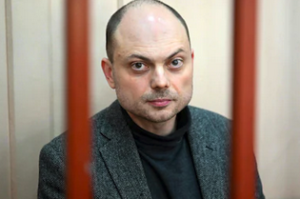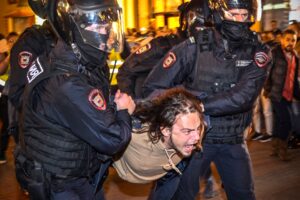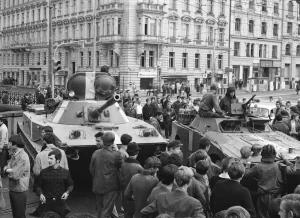Putin’s war on Ukraine is also a war on truth
Source: The Washington Post / https://www.washingtonpost.com / By Vladimir Kara-Murza /
“It takes incredible courage in today’s Russia to stand against the power in place,” Tiny Kox, the president of the Parliamentary Assembly of the Council of Europe, said this week in awarding Washington Post contributing columnist Vladimir Kara-Murza the Václav Havel Prize for his defense of human rights in his home country of Russia.

Kara-Murza is currently in a Russian prison awaiting trial on trumped-up charges of distributing “fake news” about Russia’s invasion of Ukraine. His wife, Evgenia, accepted the prestigious award on his behalf in Strasbourg, France, on Oct. 10. The prize is named for the former president of Czechoslovakia, who — before he rose to that position after the 1989 revolution that overthrew the communist regime — himself spent many years in prison for his dissident activities. The Post is publishing Vladimir Kara-Murza’s acceptance speech below.
In his remarks, Kara-Murza draws an apt parallel between Russia’s current aggression toward Ukraine and the Soviet invasion of Czechoslovakia in 1968. The Russian soldiers invading Ukraine display World War II battle flags on their vehicles and use slogans praising Stalin along with Vladimir Putin. In 1968, Czechs launched a reform campaign — known as the “Prague Spring” — that aimed to create a more liberal society by limiting the powers of the Communist state. Soviet leaders felt threatened by the prospect of a liberal democracy blossoming within the Warsaw Pact, so they sent in tanks, crushing a movement whose members included Havel and many other dissidents.
Kara-Murza, like Havel, has spent his life defending the truth from the assault of dictators. The award of this prize affirms that triumphant continuity.
– Christian Caryl, op-ed editor/international
It appears to have become a tradition of this award that most of its recipients have missed the ceremony because they have been under arrest. But then again, Václav Havel was a political prisoner himself — for the last time just months before he would become president of Czechoslovakia.
Havel once said that “if the main pillar of the system is living a lie, then … the fundamental threat to it is living the truth — this is why it must be suppressed more severely than anything else.” The reality of Vladimir Putin’s regime in Russia bears out these words to the full. With the start of this brutal invasion of Ukraine, Putin also launched another war — a war on truth in our own country. Since February, Russia’s remaining independent media outlets have been silenced; the authorities have imposed near-total censorship of the internet and social media; while new, hastily passed laws have criminalized public opposition to the war with up to 15 years of imprisonment. Just as in communist Czechoslovakia that imprisoned Havel; just as in the Soviet Union that, even in its most “liberal” periods, imprisoned thousands of dissidents; in today’s Russia of Vladimir Putin, speaking the truth is considered a crime against the state.

Yet despite the arrests and the threats and the tidal wave of repression, thousands of Russians have voiced their opposition to the war on Ukraine. According to human rights groups, some 19,000 people were detained by police at antiwar protests since February. Nearly 4,000 have faced administrative charges for speaking out against the war. Dozens, including me, are now imprisoned for it. Journalists, lawyers, teachers, priests, artists, politicians, military officers — people of different backgrounds and different vocations — who could not stay silent in the face of this atrocity, even at the cost of personal freedom.
I want to dedicate this prize to all of them. And the monetary part of the prize will go toward creating a special fund to support the families of Russian political prisoners. Families that now have to live without their spouses, their parents, or their children because their loved ones have refused to be complicit in the evil perpetrated by their government.

In August 1968, as Soviet tanks invaded Czechoslovakia to crush the Prague Spring, seven people came out on Red Square in Moscow in a silent demonstration of protest. They weren’t there even five minutes; they were beaten, arrested, and herded away almost immediately. But after what they did, no one could say that there was nationwide approval in the Soviet Union for the invasion of Czechoslovakia. As a Prague newspaper wrote, “there are now at least seven reasons for which we will never be able to hate the Russian people.” Today, Ukraine and the free world have thousands of reasons.
I am sorry that I am not able to join you in person today — but I look forward to being back here in Strasbourg when a peaceful, democratic and Putin-free Russia returns to this Assembly and to this Council; and when we can finally start building that whole, free and peaceful Europe we all want to see. Even today, in the darkest of hours, I firmly believe that time will come.

